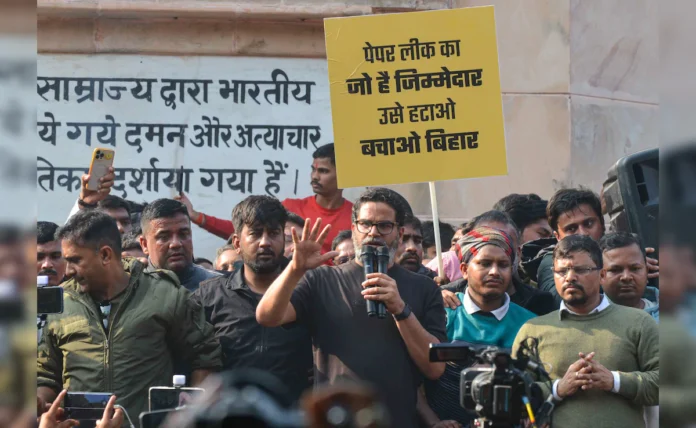Prashant Kishor Faces Protest from agitated BPSC aspirants at Gandhi Maidan, Patna, on Sunday night, following the police’s lathi-charge during their demonstration. The protesters accused Kishor of being absent during the police action, which included the use of water cannons and batons against them. The protest was part of the ongoing demand for a re-examination of the 70th Bihar Public Service Commission (BPSC) preliminary exam and a meeting with Chief Minister Nitish Kumar.
Tensions escalated when Kishor arrived at the protest site at Gardanibagh, where he faced chants of “Prashant Kishor, go back.” A heated exchange followed as students questioned his absence during the police crackdown. Kishor’s remark, “You take blankets from us and then show us attitude,” further angered the already upset aspirants.
The Origin Of The Protest
The protest, which began on December 13, the day of the 70th BPSC preliminary exam, gained momentum as thousands of aspirants demanded a re-examination and accountability for alleged irregularities. Aspirants claim that the exam was fraught with errors, leading to widespread dissatisfaction and calls for justice. Over time, the protest attracted support from political leaders, educationists, and activists, creating significant pressure on the state government.
Kishor’s Controversial Role
Prashant Kishor, the political strategist-turned-politician, initially expressed his support for the BPSC aspirants and their cause. However, his absence during the police action on Sunday raised questions about his commitment. Protesters accused him of leaving the site just before the lathi-charge, sparking outrage and leading to his eviction from the protest.
Kishor, addressing the media on Monday, provided a detailed account of the events, stating that he had advised the students to disperse 45 minutes before the lathi-charge occurred. He condemned the police action and announced his plans to file an FIR against Patna Police, take legal action, and approach the Human Rights Commission. Additionally, Kishor warned that if the government fails to address the students’ demands, he would join the protest starting January 2.
Bihar Police’s Response To The Protest
The police lathi-charge at Gandhi Maidan drew criticism from various quarters. Videos and eyewitness accounts reveal the excessive use of force against peaceful protesters, including water cannons and batons. The police justified their actions, claiming that the gathering violated public order and posed a security threat. However, these claims have been contested by students and activists, who argue that the police response was disproportionate and unwarranted.
The incident has reignited debates about police accountability and the right to peaceful protest in Bihar. Political parties and human rights organizations have called for an independent inquiry into the incident to determine whether the police acted within the bounds of the law.
Political Fallout Of The Incident
The confrontation between Prashant Kishor Facing Protest and BPSC aspirants has sparked political debates in Bihar. While the BJP and JDU have largely remained silent, the Rashtriya Janata Dal (RJD) criticized Kishor for allegedly abandoning the students. RJD leader Tejashwi Yadav accused Kishor of using the protest for political gain and failing to protect the aspirants when they needed him most.
In response, Kishor denied the allegations and asserted that he had acted in the students’ best interest. He emphasized that the movement was student-led and that his role was to provide strategic guidance and support.
Chhatra Sansad’s Role In The Protest
The ‘Chhatra Sansad’ (Student Parliament), a student-led initiative supported by Kishor, played a pivotal role in organizing the protest. The group has been vocal about its demands, including a re-examination of the BPSC preliminary exam, accountability for police excesses, and a dialogue with Chief Minister Nitish Kumar.
Despite the challenges, the Chhatra Sansad has continued to rally support from various quarters, ensuring that the protest remains in the spotlight. The group’s efforts have been lauded by educationists and activists, who see it as a symbol of youth empowerment and resilience.
The Road Ahead For The Protesters
As the protest enters its third week, the students remain steadfast in their demands. Kishor’s announcement of joining the protest on January 2, if no resolution is reached, has added a new dimension to the movement. The aspirants have also announced plans to intensify their agitation, including hunger strikes and statewide demonstrations.
The government, on its part, has remained largely non-committal, with no concrete assurances provided so far. The Chief Minister’s office has stated that the matter is under review, but protesters argue that this is not enough. They have called for immediate action to address their grievances and restore their faith in the examination process.
Public Reaction To The Incident
The protest and the subsequent lathi-charge have sparked widespread outrage on social media, with hashtags like #BPSCProtest and #JusticeForAspirants trending on X (formerly Twitter). Citizens have expressed solidarity with the students, criticizing the state government and police for their handling of the situation. Many have also called for Prashant Kishor to take a more active role in supporting the movement, given his initial involvement.
The incident has also drawn attention to broader issues of governance and accountability in Bihar. Critics argue that the state’s handling of the protest reflects a lack of commitment to addressing systemic issues in public examinations and policing.
A Turning Point In Bihar’s Political Landscape
The ongoing protest and the controversy surrounding Prashant Kishor Facing Protest could have far-reaching implications for Bihar’s political landscape. For Kishor, this incident is a test of his leadership and credibility as a politician. For the students, it is a fight for justice and accountability. As the situation unfolds, it remains to be seen whether the government will address the protesters’ demands or if the movement will escalate further.


